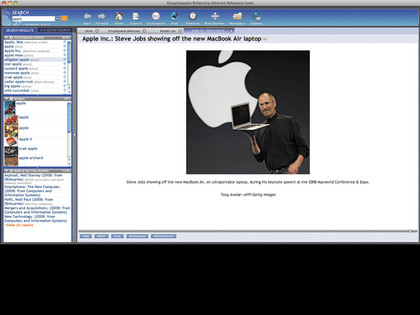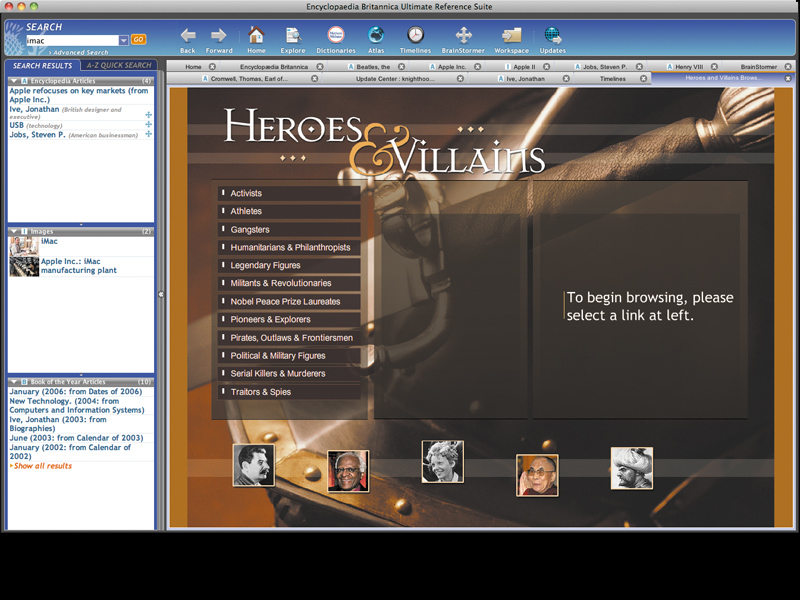TechRadar Verdict
Reliable, but old fashioned. Good for the kids though
Pros
- +
Reliable content
- +
Good research tool
- +
You can cut and paste
Cons
- -
Only six months' online access
- -
Still has annoying screen flicker
- -
Wikipedia is 'free'
Why you can trust TechRadar
Hot on the heels of last year's Britannica 2009 Ultimate Edition, comes – yes, you've guessed it – the 2010 edition.
It's a multimedia version of the famous encyclopaedia that bills itself as 'three encyclopaedias in one' because it comes with a Child's Library, for ages 6-10, a Student Library aimed at students aged 10-14 and the full Encyclopaedia Britannica Library.
Each of these has an age-appropriate interface. Once you've registered there's also a year's worth of free online updates to the encyclopaedia; you also get six months' free membership to the online version of Encyclopaedia Britannica, worth £25.
The online version is very good, and many might find it more useful than this DVD based version, since you can use it anywhere you can get an internet connection. However, the 2009 edition gave us a full year's membership, rather than just six months, so we have to call foul here.
Up to date?
How you rate an encyclopaedia depends on what you'll use it for. For historical topics such as the English Civil Wars and Henry VIII, it proved to be comprehensive, offering pictures, dates, links to extra info and more.
But for the sort of things a technology journalist would be interested in, such as SSD or RAID, there was nothing. Its entry on Apple, Inc was well written, but felt old. It seemed to trail off after the iPhone 3G was released, with no mention of the iPhone 3GS, App Store or iPod touch.
Sign up for breaking news, reviews, opinion, top tech deals, and more.
Its entry for Steve Jobs was even more out of date, with no mention of anything that has happened to him post 1998. In comparison, the free online encyclopaedia, www.wikipedia.com has much more current information.

The books it recommends as additional reading don't link to Amazon and there are no links to websites outside of Britannica.
Another year on and Britannica seems even more old-fashioned. It's like a relic from the bygone era of multimedia CD-ROMs.
Take its atlas, for example. In these days of Google Earth and Google Maps, we expect to click on a country and watch the screen zoom in, then we should be able to pan around a scaleable map until we have found what we're looking for.
Instead you get a 2D flattened globe, and clicking on a country takes you to a single, low-res, tiny map that shows you little more than the outline of the country.
On the positive side, when it comes to accuracy of information, Britannica delivers. Everything it contains is well written and accurate. We also really liked the BrainStormer feature that enables you to search for related content in a visual way. It's also safer than letting the kids play around on the internet to research their homework.
The big problem remains, however, that while free resources like Wikipedia can never claim the same level of accuracy as Britannica, they are, in comparison, free, provided you have internet access.
Follow TechRadar Reviews on Twitter: http://twitter.com/techradarreview

Graham is the Senior Editor for AI at TechRadar. With over 25 years of experience in both online and print journalism, Graham has worked for various market-leading tech brands including Computeractive, PC Pro, iMore, MacFormat, Mac|Life, Maximum PC, and more. He specializes in reporting on everything to do with AI and has appeared on BBC TV shows like BBC One Breakfast and on Radio 4 commenting on the latest trends in tech. Graham has an honors degree in Computer Science and spends his spare time podcasting and blogging.
